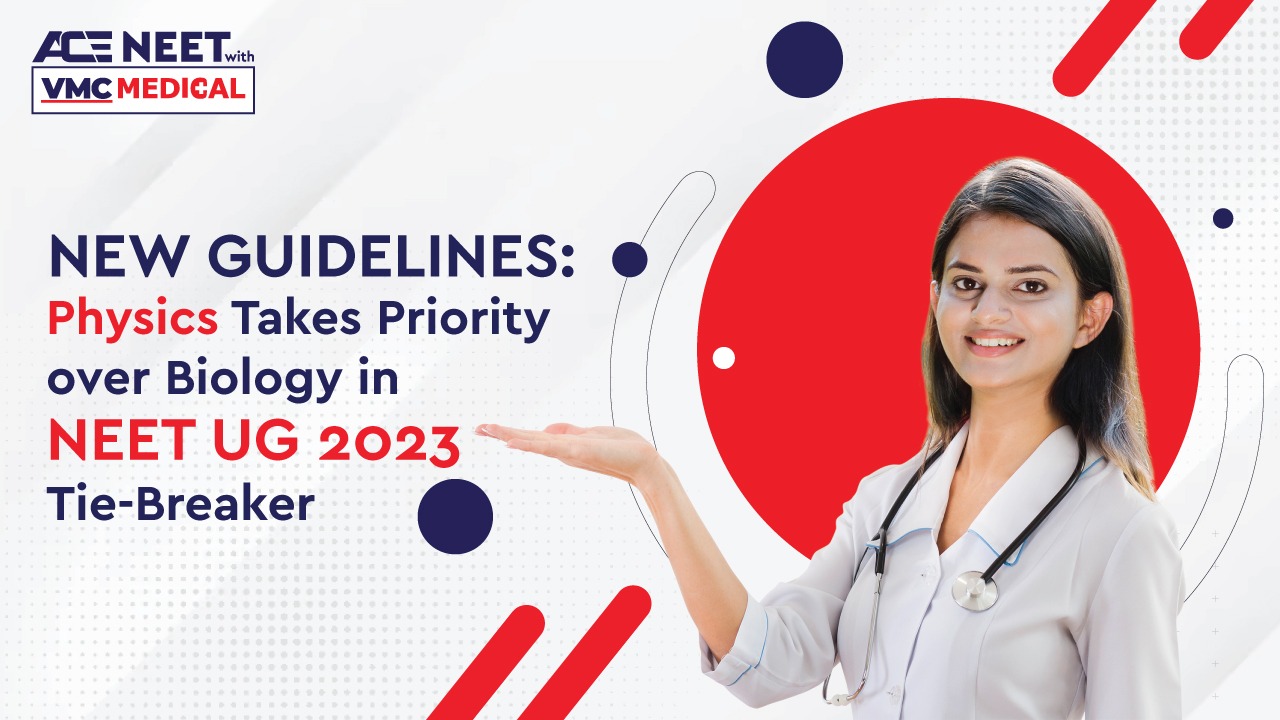NEET UG 2023 Tie-Breaker Update: Physics Reigns Supreme over Biology in New Guidelines!
 Posted On
Posted On
333 total views, 1 views today
In a significant development, the National Medical Commission (NMC) has recently announced revised guidelines for determining the ranks of candidates who achieve identical scores in the National Eligibility cum Entrance Test (NEET) for undergraduate medical courses. Departing from the previous practice of giving priority to Biology marks, the NMC has decided to prioritize Physics marks in case of a tie. The new guidelines, which are expected to be implemented from next year, aim to ensure a fair and transparent ranking process. This blog explores the details of the revised guidelines and their implications for aspiring medical students.
Revised Tie-Breaker Rules:
Under the Graduate Medical Education Regulations-2023, the NMC has introduced a new approach to resolve ties in NEET scores. In the event of two or more candidates obtaining the same marks, the subject-wise marks will be considered in the following order: Physics, Chemistry, and Biology. Previously, Biology held the utmost priority, followed by Chemistry and Physics. However, if the tie persists even after considering subject marks, a computerized draw of lots will be conducted without any human intervention to determine the merit list.
Objective and Impartial Ranking:
The primary objective of these new guidelines is to establish an impartial and fair ranking system for NEET-UG aspirants. By prioritizing Physics, the NMC aims to recognize the importance of this fundamental science in the medical field. Physics plays a crucial role in understanding various concepts in medical sciences, including radiology, imaging techniques, and biomechanics. Hence, this change in the tie-breaker rules encourages aspiring medical students to focus on developing a strong foundation in Physics alongside Biology and Chemistry.
Deliberations and Future Implementation:
The National Testing Agency (NTA), responsible for conducting NEET-UG, and the NMC are currently engaged in discussions to deliberate on the implications and feasibility of the revised guidelines. These deliberations will ensure that all aspects and concerns are thoroughly addressed before the guidelines are implemented. The NTA and NMC share a common objective of enhancing the transparency and credibility of the NEET examination, which serves as a crucial gateway for medical admissions in India.
Benefits of Prioritizing Physics:
By assigning priority to Physics in tie-breaker situations, the NMC acknowledges the importance of this subject in medical education. Physics provides the foundation for understanding the principles behind medical equipment, diagnostics, and various technological advancements in healthcare. Strengthening the knowledge and application of Physics among medical students will result in a more comprehensive understanding of medical concepts and foster innovation in the field.
Completion of MBBS Course and Attempts Limit:
The revised regulations also outline certain guidelines regarding the duration of the MBBS course and attempts to clear the first year. The NMC mandates that students pursuing the MBBS program finish it within nine years of the admission date. Additionally, they will be allowed a maximum of four attempts to clear the first year. These regulations aim to ensure that students’ progress efficiently through their medical education and complete the course within a reasonable timeframe.
Common Counselling for Graduate Medical Courses:
To streamline the admission process, the NMC has mandated common counselling for admission to graduate medical courses in all institutions across India. The counselling will be based on the NEET-UG merit list, and the seat matrix will be provided by the NMC. This centralized counselling process aims to simplify the admission procedure and ensure equal opportunities for all eligible candidates.
Final Thoughts:
In conclusion, the National Medical Commission’s decision to prioritize Physics over Biology in tie-breaker situations for NEET-UG scores brings about a significant change in the ranking process for aspiring medical students. The revised guidelines aim to establish a fair and transparent ranking system by recognizing the importance of Physics in the medical field. By strengthening the knowledge and application of Physics among medical students, the NMC expects a more comprehensive understanding of medical concepts and an increased capacity for innovation in the field. The decision also emphasizes the need for aspiring medical students to focus on developing a strong foundation in Physics alongside Biology and Chemistry. Additionally, the NMC’s introduction of common counseling for admission to graduate medical courses and the guidelines regarding the duration of the MBBS course and attempts limit further aim to streamline the admission process and ensure efficient progression through medical education. Overall, these revisions demonstrate the NMC’s commitment to enhancing the transparency, credibility, and quality of medical admissions in India.
